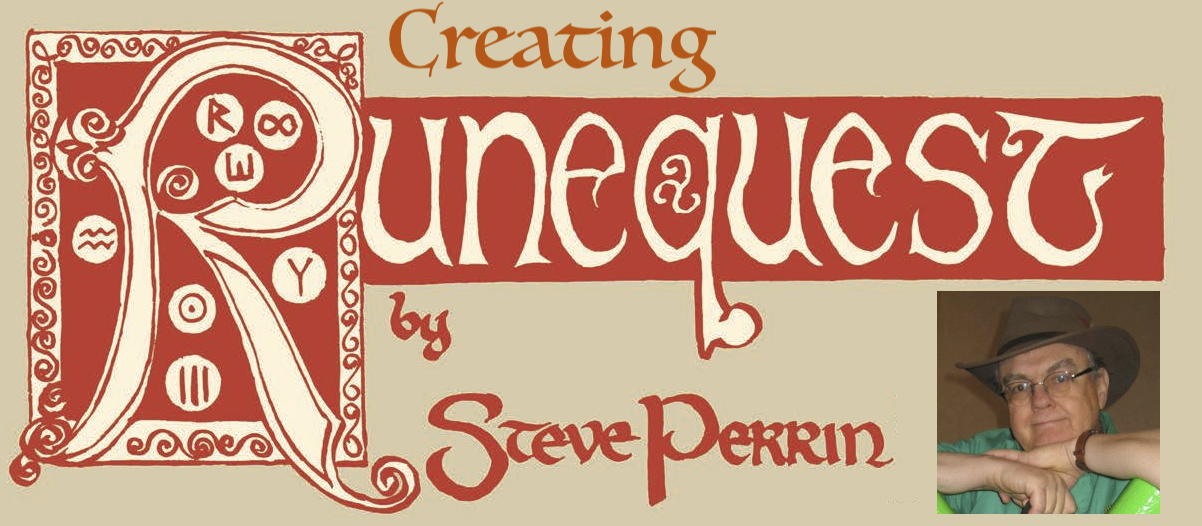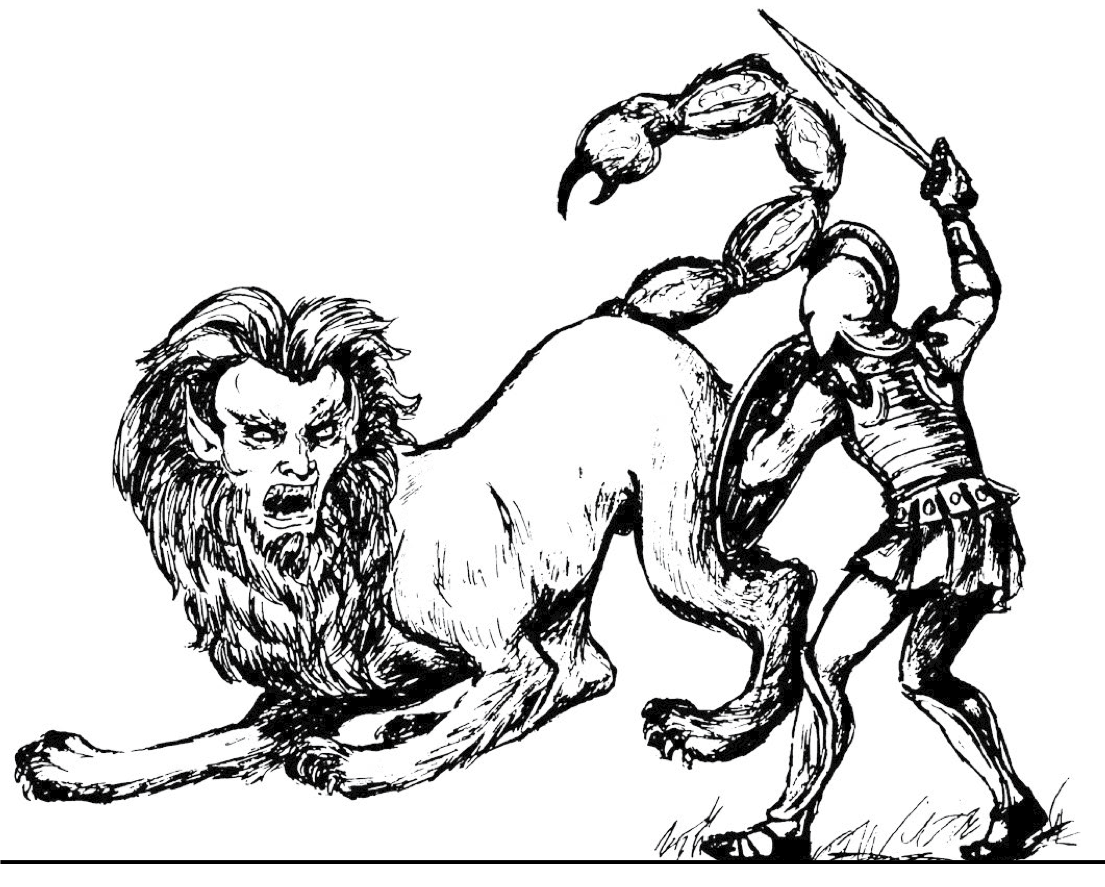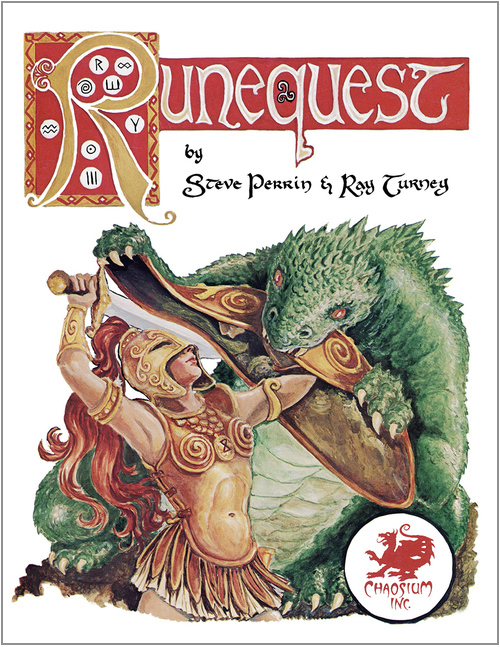Steve Perrin: Creating RuneQuest – Part Three: Ha Ha in the basement
Posted by Michael O'Brien on 15th Aug 2021

For our RuneQuest Classic Kickstarter in 2016 Steve Perrin generously provided a personal account of his role in the genesis of the RuneQuest roleplaying game. Although at the time of the Kickstarter we publicly featured an excerpt of Steve's recollections, the full account was only ever published a high level backer item (in the RuneQuest Playtest Manuscript) and so only received limited circulation.
In memory of Steve, here we present his account in full as a six part series, offering his fascinating insights into the development of RuneQuest, the rules that cemented Steve Perrin as one of the most influential game designers of all time.
- Part One: "The Chaosium’s role playing game”
- Part Two: Any character can do anything
STEVE PERRIN: I started running playtest games of “The Chaosium Game” at my house in Oakland. Warren and I had this nice basement room to turn over to a large gaming table and a ragtag collection of discarded chairs for gamers to sit in. My wife Luise, not a gamer, liked to listen to the conversation and laughter coming through the heating vents. She called it the “Ha Ha in the basement.” When it came time to publish the game, which by this time had acquired the RuneQuest name, Luise contributed a cover and interior artwork that is still praised today.
When we started, AD&D was just getting going, and the main alternatives for those who were looking for something different from it were Tunnels and Trolls, Bunnies and Burrows, and Chivalry and Sorcery. Elements of the first two appear in RuneQuest, such as armor absorbing damage and the approach to some skills. Certain friends of mine call RuneQuest one of the best researched games of its time.
I suppose we can take credit for being the first role playing game that didn’t use a Frick & Frack style title. I came up with the RuneQuest name by combining the Runes created or adapted by Greg as background for his world of Glorantha with Quest, a nice heroic sounding noun.
A perennial question since the game debuted has been “What is a Rune Quest?” This question has been answered in several different ways in several different venues. All do a pretty good job. Sven Lugar, a Southern California gamer I knew from our SCA days who helped with play testing, suggested that you became a Rune Lord or Priest by “attaining a Rune.” Nice concept, just how it is done is still open to discussion.
By this time several of my gaming friends were active play testers of RuneQuest. Some of them have even been published by the Chaosium in early supplements to the game. Among them are Bill Keyes, Gordon Monson, Anders Swenson, Terry Jackson, T.O. Green, and Tony Hughes. If I remember correctly, the Chaosium play test group consisted of Ken Kaufer, Rory Root, and Greg himself – but I may be confusing the time between the first and second editions of the game. Most of the play testing took place in my basement, as I still had a day job at the time and was just contracting with Chaosium.
Our play testing campaign centered in the ancient city of Pavis, looming over the River of Cradles, the lonely river that meanders through the Plains of Prax – providing the only sure source of water. The ruins of Pavis provide several square miles of deserted city possibly hiding the treasures of earlier times. For an overall conflict to establish the background, we postulated that the Lunar Empire had conquered Dragon Pass and sent their legions into Prax. This is the actual prelude to the events of White Bear & Red Moon as established by Greg’s chronology, so we were on fairly solid ground.
Wanting to monopolize the treasures of Pavis, the Lunars forbade independent adventurers to enter the ruins. And so the tunnels were dug and adventurers had to sneak into the ruins, occasionally engaging Lunar patrols as well as the resident monsters among the trolls and Broo of the ruins.
These play test sessions found some problems that got fixed. The main problem was that it was difficult to build a character up to Rune Lord or Rune Priest, so some of the problems with skills over 100% did not get fixed immediately. To test what rules we had for the conditions, I created a Rune Lord named Rurik, whose adventures in the rule book are essentially fiction. He sprang as the sun at sunrise over a Sun Dome temple, whole and Rune bound upon the play test scene. He also died ignominiously on a Trollkin’s spear on his 3rd or 4th adventure.
When we started, the Attributes had already been fixed – essentially the D&D Attributes with Power substituted for Wisdom - and characters had a very small number of “mana points” to power their spells. For the most part magic was Ray’s bailiwick but I felt that the very few mana points were a definite hindrance to the survival of adventurers. I suggested that a spell slinger would be using his actual Power for spells. Since Power was already the defense against magic, this meant the mage would have more power for spells, but his defense would slowly decline. A nice concept but it got too deadly for magic users – so now characters use mana that is equal to their Power.
Of course, the “spend Power for Magic results” concept still survives in the sacrifices a Rune Priest must make to gain use of Rune Magic.
As part of my D&D play I had conceived of Strike Ranks to determine who had the first strike in a combat. It is based somewhat on my experience in the SCA. I ported this concept over to RuneQuest and it has gone through several mutations since then. It was not originally meant to control every little action in a combat round. The later implementation of this idea was clumsy (my fault as much as anyone’s, I was working on it) and I personally have gone away from it, though some players consider it central to play.
Sven Lugar created and pioneered the use of the Resistance Table, which is almost an entirely different game system. It is very useful for magic duels, perhaps less useful for other procedures. Particularly when applied to percentile skills it has a limited utility. But it became a feature of all Basic Role Playing – based games.

Next: Came the Ducks

